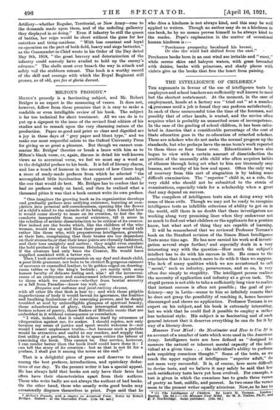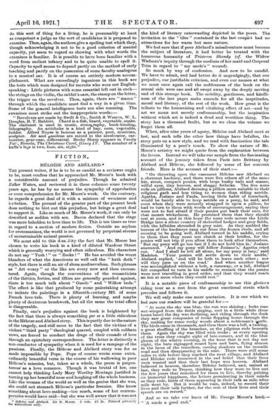THE INTELLIGENCE OF CHILDREN.*
THE arguments in favour of the use of intelligence tests by employers and school teachers are sufficiently well known to need but the shortest restatement. At the moment, in the case of employment, hands at a factory are " tried out " at a number 04 processes until a job is found they can perform satisfactorily. In each of these unsuccessful tries the time of the foreman, and possibly that of other hands, is wasted, and the novice often acquires what is probably an unmerited sense of incompetence. In the case of the grading of school children, it has been calcu-
lated in America that a considerable percentage of the cost of State education goes in the re-education of retarded scholars. These are scholars who do not make the normal progress up the standards, but who perhaps have the same term's work repeated to them three or four times over. Educationists have also begun to view with a certain amount of dissatisfaction the position of the unusually able child who often acquires habits of idleness through being set what to him are tiresomely easy lessons, not worthy of his bow and spear. Often the only way of recovery from this sort of stagnation is by taking some difficult examination. The " superior " child is, as a rule, the very child who should not be submitted to the strain of examinations, especially trials for a scholarship when a great deal may depend on success.
The compilers of intelligence tests aim at doing away with some of these evils. Though we may not be ready to recognize intelligence tests as infallible criterions of ability to get on in the world, still there is no doubt that these investigators are working along very promising lines when they endeavour not so much to find out what children or the applicants for a position know, but what sort of thing they are capable of learning.
It will be remembered that we reviewed Professor Terman's book on the Stanford revision of the Simon Binet Intelligence Tests some time ago. He has now carried his work ard investi- gation several steps further,' and especially deals in a very interesting way with the question—How much the subject's intellect has to do with his success in life. He comes to the conclusion that it has much more to do with it than we suppose. The lack of many qualities which we are accustomed to call " moral," such as industry, perseverance, and so on, is very often due simply to stupidity. The intelligent person realizes the necessity of application and industry at a given task. The stupid person is not able to take a sufficiently long view to realize that instant success is often not possible ; the goal of pro- ficiency—say in Latin—seems to him so infinitely remote that he does not grasp the possibility of reaching it, hence becomes discouraged and shows no application. Professor Terman is an expert on his subject, and his book is extremely interesting, but we wish that he could find it possible to employ a rather less technical style. His subject is so fascinating and of such general interest that it deserves everything he can do for it by way of a literary dress. • Measure Your Mind : the Mentinader and How to Use It= is
an account of a number of tests which were used in the American Army. Intelligence tests are here defined as " designed to measure the natural or inherent mental capacity of the indi- vidual at a given time . . . the individual's ability to perform acts requiring conscious thought." Some of the tests, as we reach the upper regions of intelligence " superior adult," do not seem very successful. It is, of course, here more difficult to devise tests, and we believe it may safely be said that few such satisfactory tests have yet been evolved. For example, a test is given in which the examinee has to grade three verses of poetry as best, middle, and poorest. In two cases the verses seem to the present writer equally atrocious. Now, as he has to • (1) The Intelligence of Children. By Lewis 31. Terrnan. London Rump. (Ss. lid.)—(2) Measure Your Mind. Br M. R. Trabne. Ph.D.. and jr. P. Stockbridge. Same publisher. i103.
do this sort of thing for a living, he is presumably at least
as competent a judge as the sort of candidates it is proposed to examine. Then, again, the authors give a spelling test which they, though acknowledging it not to be a good criterion of mental
capacity, yet seem to regard as showing with what words the examinee is familiar. It is possible to have been familiar with a word from earliest infancy and to be quite unable to spell it.
Capacity to spell seems to depend partly on the method of early teaching and partly on the possession of some faculty analogous to a musical ear. It is of course an entirely modern accom- plishment. What are exceedingly ingenious in this book are the tests which were designed for recruits who were not English- speaking : Little pictures with some essential left out in each— the strings on the violin, the rabbit's ears, the stamp on the letter, the trigger on the revolver. Then, again, there are " mazes " through which the candidate must find a way in a given time. Some of the general intelligence tests are also amusing. The examinee must strike out the inappropriate words:—
" Revolvers are made by Swift & Co., Smith & Wesson, W. L. Douglas, B. T. Babbitt. Chard is a fish, lizard, vegetable, snake. The clarionet is used in music, stenobraphy, book-binding, lithography. An artichoke is a kind of hay, corn, vegetable, fodder. Alfred Noyes is famous as a painter, poet, musician, sculptor. Air and gasolene are mixed in the accelerator, car- buretor, gear-case, differential. Becky Sharp appears in Vanity Fai-, Romola, The Christmas Carol, Henry IV. The number of a kaffir's legs is two, four, six, eight."



































 Previous page
Previous page